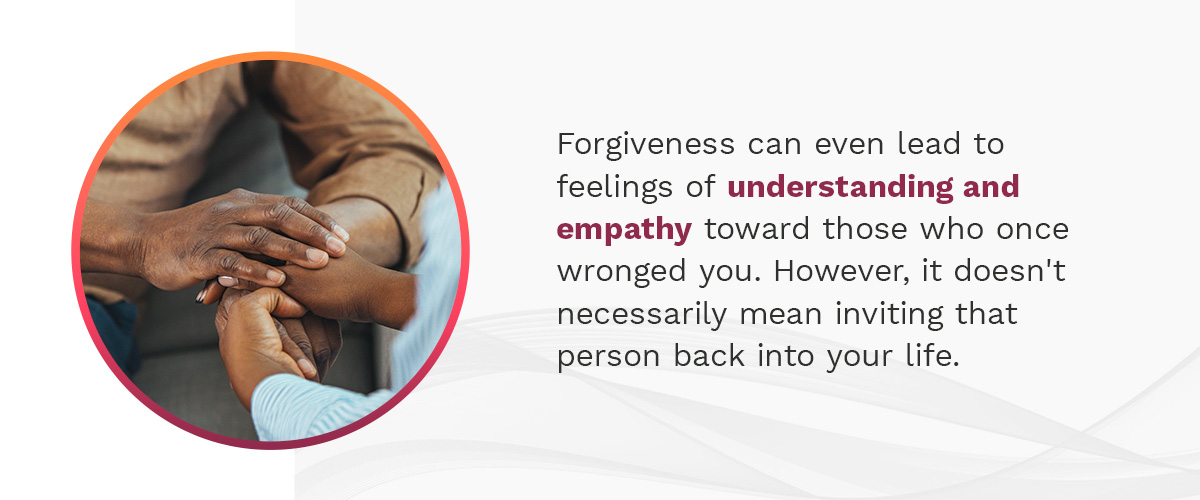The Role of Forgiveness in Addiction Recovery
Addiction and forgiveness can be challenging to reconcile for many people in recovery. When you first seek treatment, it’s common to experience feelings of resentment, guilt, shame, sadness or anger when met with memories of the past. You might find it difficult to work through trauma, and being around triggers can often intensify complex emotions.
However, forgiveness in recovery is crucial. Learning to forgive the past and center yourself in the present can lead to a healthier, happier future. Learn more about the role of forgiveness in recovery and a few practical steps you can take to forgive yourself and those around you.
Why Forgiveness Matters
Addiction is often a way to handle trauma, abuse or neglect. When a person enters recovery and stops drinking or taking substances, the wounds often resurface, bringing an array of emotions with them. The healthiest way to heal and achieve a substance-free life is through forgiveness. Forgiveness matters because it:
- Prevents health complications: Holding onto anger and resentment can be detrimental to health, leading to risks like high blood pressure, high cortisol levels and increased risk of a heart attack.
- Prevents negative feelings: Moreover, resentment in recovery can keep you focused on negative feelings and keep you feeling like a victim. This mindset can make it difficult to enjoy positive emotions and move forward productively. It can also give more power to the person who hurt you.
- Helps you heal: Forgiveness doesn’t necessarily mean you need to invite people back into your life. It’s primarily focused on letting go of anger and choosing to not let it affect your life in unproductive ways. When you can let go of the pain, you can start to heal the mind, body and spirit.
- Provides a sense of freedom: Most importantly, forgiveness provides a sense of freedom, where you can move forward without shaming yourself over past mistakes. Many people persist in self-destructive behavior because they feel shameful or deserving of their suffering. The problem is that this mindset limits your ability to move on. Recognizing forgiveness in your recovery journey can help you work every day to become a better person.
Forgiving Others
Forgiveness in recovery is crucial, as it can help you let go of any resentment that might be holding you back. While certain people or events may trigger feelings of anger, bitterness or depression, professional treatment can help you process trauma and move forward with a healthier mindset. It’s a process that takes time, and a choice you’ll have to make over and over again. The Role of Forgiveness in Addiction Recovery.
When we are hurt by someone, especially by those we love and trust, it can lead to anger, sadness and confusion. Dwelling on the harmful situation can allow hostility to take root. Allowing these negative feelings to crowd the positive ones can cause you to bring bitterness into new relationships and experiences and become depressed and anxious.
Forgiveness is not about forgetting, nor is it about excusing the harm done to you. It’s about recognizing how resentment can continue giving others power over you and making the intentional decision to let go. Sometimes forgiveness can even lead to feelings of understanding and empathy toward those who once wronged you. However, it doesn’t necessarily mean inviting that person back into your life.
Forgiveness in recovery can lead to improved health and peace of mind. You can also appreciate healthier relationships, better emotional and mental health, less anxiety, reduced symptoms of depression and improved self-esteem. When you can free yourself from the pain and resentment, you can truly heal and embrace hope.
Forgiving Yourself
Many people struggle to forgive themselves in recovery, but it’s just as necessary and healthy as forgiving others. Grace and compassion can help you heal and allow you to provide that to others as well.
Forgiving yourself requires empathy, kindness and understanding. It’s also about accepting that forgiveness is a choice. However, moving forward is often easier said than done. Try to remind yourself that humans are imperfect and we all make mistakes. The trick is learning to move on from setbacks. As uncomfortable as it may feel, there are things in life worth enduring the process to move forward, and forgiveness is one of them.
Focusing on your emotions and processing them healthily is a crucial step toward forgiveness. Give yourself permission to accept your feelings that might be triggering you. When you identify your feelings and give them a voice, you can start to accept that mistakes are inevitable and how freeing forgiveness can be.
How to Forgive: 5 Practical Steps
Ultimately, forgiveness is a choice not to let anger or resentment consume you anymore. While the process may come easy to some, others just starting on their journey can find it difficult.
Here are 5 practical steps to forgive yourself and others:
1. Allow Yourself to Grieve
One of the first steps in learning to forgive is allowing yourself to grieve. Before you can move forward, you need to give yourself permission to accept the feelings that have triggered you. While you do not need to forget about your past, accepting your feelings can provide peace around any complicated emotions you’re experiencing. So, breathe, pause and take care of yourself before turning to the problem at hand.
2. Work Through Feelings on Paper
Writing can help you discover your inner critic and develop self-compassion. When experiencing distressing emotions, write out a conversation between yourself and this critical voice. That way, you can identify thought patterns contributing to self-destruction and your inability to forgive yourself.
You can also take time to list qualities you like about yourself, including skills and strengths. This might help boost confidence when you’re feeling down about past mistakes.
3. Challenge Your Thoughts
After you’ve identified harmful thought patterns, you can start to challenge them and learn to embrace forgiveness. An easy way to do this is by stopping yourself when you notice negative thoughts arising in your mind. You might write these down or challenge them in your head with rational responses. Often, you’ll find these thoughts are self-destructive and irrational. Over time, you can create a habit of challenging negative thoughts, leading to more self-compassion and peace of mind.
4. Make Positive Investments in Your Life
Instead of cycling resentment and other challenging emotions around in your head, distract yourself with positive investments. For instance, make strides toward your physical, emotional and spiritual health, such as exercising or participating in a favorite hobby. You can achieve a healthier, happier life when you channel resentment or anger productively.
5. Seek Professional Guidance
If you’re struggling with forgiving yourself and others, consider speaking with a therapist or counselor. Working with mental health professionals can help you uncover the reasons for your addiction and place forgiveness at the forefront of your recovery. These mentors can give you the training and skills to forgive and move forward.
Contact Transformations By The Gulf and Start Your Journey Today The Role of Forgiveness in Addiction Recovery.
Forgiveness in recovery will be paramount to your success. In recovery, you can learn to let go of anger and resentment and move forward with grace and compassion. At Transformations By The Gulf, we understand the vital role of forgiveness in recovery. Our mental health professionals can provide the tools to forgive and heal. We offer various forms of therapy, including evidence-based treatments and holistic practices to address your unique needs and goals.
Contact us today to start your recovery journey.
If you or someone you know would like to know more about Transformations by the Gulf Substance Abuse Treatment Center Give us a Call 24/7 (727)498-6498
The success of a person’s recovery depends on the level of personalized treatment provided. It is important to find an addiction treatment program that works. When we say our treatment is individualized, we mean that we craft a program that is tailored to address the client’s unique physical, mental and emotional needs. The Role of Forgiveness in Addiction Recovery.
In the client’s first 24 hours with us, we’ll evaluate their current state and work to understand what challenges they need to overcome. They’ll also have an initial session with our doctor and meet with one of our licensed mental health professionals.
After the initial evaluations, we’ll design a treatment plan with the sole mission of helping the client overcome and heal from addiction. Their program will focus on things such as:
- Addressing and Identifying root causes of addiction.
- Creating a support system.
- Developing healthy stress management techniques.
- Eliminating Substance use.
- Learning how to communicate emotions effectively.
- Maintaining a healthier lifestyle.
- Repairing damaged relationships.
Are you struggling with addiction and want to learn more? Visit Psychology Today or check out or page on addiction treatments.
Our Facility is near the beach and offers a comfortable setting for substance abuse treatment and recovery.
What a Day is Like in Our Treatment Facility.
Why Transformations by the Gulf?

